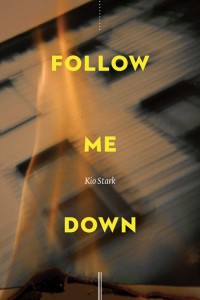by Morgan Macgregor
Kio Stark’s debut novel, Follow Me Down, hits the ground running. Lucy is a gritty young woman with bright red hair and a plastic camera. Once upon a time she had a life somewhere else, but tragedy ensued, and one day she packed up and disappeared, depositing herself in the projects of New York City.
Lucy seeks both immersion in, and distance from, her neighborhood. Photography is the perfect medium; she wanders around with her cheap camera, documenting nuances on the streets and in the lives of the urban down-and-out. Then, as if by magic, a mystery (in the form of an envelope) arrives in her mailbox. Suddenly, Lucy’s amorphous purpose pulls into focus.
Her sleuthing takes readers on a hectic crawl through the city, in particular, the parts of it that are disappearing before our eyes: the post office, the library, the city hall clerk’s office. Stark uses equal parts force and subtlety in reminding us that behind the new-fangled office loft, there’s a decaying wooden water tower, beneath the city we know, there’s an older one.
The best writing in the novel takes the form of Lucy’s hyper-awareness of the energy between people. In particular, the awkward (and often untoward) sexual friction any woman who has ever walked down any street in the world will understand. Men are constantly cooing and whistling and catcalling to Lucy. But instead of perceiving these advances as threatening (which she very well could, considering the neighborhood and her obvious fish-out-of-water status), Lucy treats them with utter curiosity. She wonders, for instance, what would happen if she were actually to reciprocate. “The approach is plain, I am not in doubt of what they want. But how, what words exactly would we speak, how could one of these exchanges of street intimacy proceed? Maybe they know that, maybe it’s that boundary of impossibility that gives them license to sing out their lust openly. Or, maybe not.”
It’s just when most women would be tempted to speed up, to tuck in and walk faster, that Lucy slows down. But don’t mistake her curiosity for innocence. Lucy has her finger on the pulse. When a man, who’s wrapped in the arms of his lover, keeps looking at Lucy: “He looks at me again, his eyes say it: it would be different if it was you. But he is wrong. Who among us is happy?”
As the mystery deepens around her, Lucy’s approach can be frustrating for a reader. When she gets a list of potential suspects for inquiry, why does she start with the one that lives the furthest away? And why doesn’t she just call him, instead of taking the subway for two hours? Why doesn’t she use the internet? When an informant alludes to holding the key to the mystery, why doesn’t she just ask him for it?
Stay with it. As things start to unravel, we uncover the reason for Lucy’s clumsy investigating: deep down, Lucy doesn’t want to know the truth. “I slow even more as I turn the corner and approach my destination, the end of the line, the end of the story. No matter how slowly you pace yourself, eventually you arrive.” Lucy already knows, has always known, that the truth is fickle and labyrinthine, that “each resolution carries another mystery inside it.”
That’s the heartbreaker of Follow me Down, because what Lucy was really looking for was healing, and the truth doesn’t heal. Sometimes, the closest thing to healing is distraction, and for that, you need another mystery.
Some of Stark’s prose is a little too whimsical, as when Lucy stops a man on the street to ask him, dreamily, “Did you see the moon?” or when she remarks, about a man with bags under his eyes, “Maybe the pockets beneath his eyes are filled with undreamt dreams.” But ultimately, the novel succeeds. Stark shows us (rather starkly, if I may) how one person tries and fails to leave pain behind.
This post may contain affiliate links.









